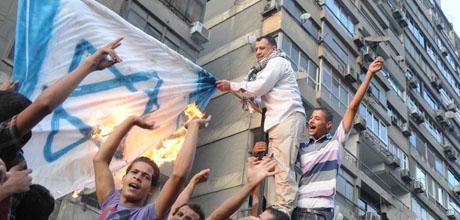On Sept. 9, Egyptian protesters broke into the Israeli embassy in Cairo, Egypt.
According to The Washington Post, the attack began on Friday when 1,500 protesters crowded around the embassy security walls. Using sledgehammers, and in some cases their bare hands, the protesters began trying to take down the walls.
The protesters trapped six security guards inside the Embassy building creating a diplomatic crisis for the two countries, and blatantly violating the 1979 peace treaty between Egypt and Israel, which was facilitated by Jimmy Carter.
“The treaty created cold peace,” said Director of the Friends Center and Campus Ministry Coordinator Max Carter. “It provided $3 billion in foreign aid from the United States every year for each country, in exchange for a promise to buy mostly U.S. military equipment.”
Carter explained that most of this money was kept by politicians while many Egyptian citizens live at or below the poverty line.
“I do not think [the peace treaty] ever filtered down to the general populace as a popular thing, especially during the Mubarak era,” said Carter. “So of course after he was ousted (the peace treaty) became extremely unpopular.”
The United States’ interest in the attack stems not only from its connections to the peace treaty but also from the longstanding U.S. alliance with Israel. This alliance began with the U.S. believing strongly in the creation of a “homeland” for the Jewish community in 1948. Subsequently, the U.S. was one of the first world powers to recognize the state of Israel in 1949, and, since then, the U.S. has provided significant monetary and military support. Today, the U.S. provides $3 billion annually, mostly in the form of military support.
Although the attack happened on the other side of the world, its implications have echoed across Guilford campus.
Fourth-year Sarah-Jaana Nodell, co-president of Guilford’s Jewish club, Hillel, said that the attack has increased animosity between the two countries.
“(The attack) is actually helping to increase the divide rather than bring peace,” said Nodell,”which is not helpful given the number of terrorist and counter-terrorist groups in that region.”
Third-year Sara Hussein, from Egypt, provides an alternate look at the situation, citing previous violence that could have led up to the conflict.
“Apparently Israelis came into Egyptian territory and shot eight Egyptians, and the mass media there, which is now free, inflamed the situation,” said Hussein.
Carter perceives a more deeply seated reason behind the attack.
“Egypt sees the treatment of the Palestinian people as if Israel was a colonizing power,” said Carter. “They also realize that they will not be able to carry out the colonization without an alliance with the U.S.”
Palestine’s bid for statehood can also be seen as a possible catalyst for the attack. Israel’s treatment of Palestine and the denial of statehood has created a volatile situation in the Middle East.
“While I do not agree with the violence, I do understand the reasons behind it,” Carter said. “The extremely unfortunate thing is that it is likely to get worse on Tuesday, when the U.S. vetoes Palestine’s attempt at statehood, which they already said they are going to do. If you thought this was bad, wait until Tuesday,”
This attack is just one among several recent attacks on foreign embassies, reflecting how fragile the political climate is on a global level.
“There are a lot of embassies being attacked right now and it makes me very nervous,” said Nodell. “People are not coming together to take a self-critical view and asking ourselves ‘What have we done to provoke this?'”

